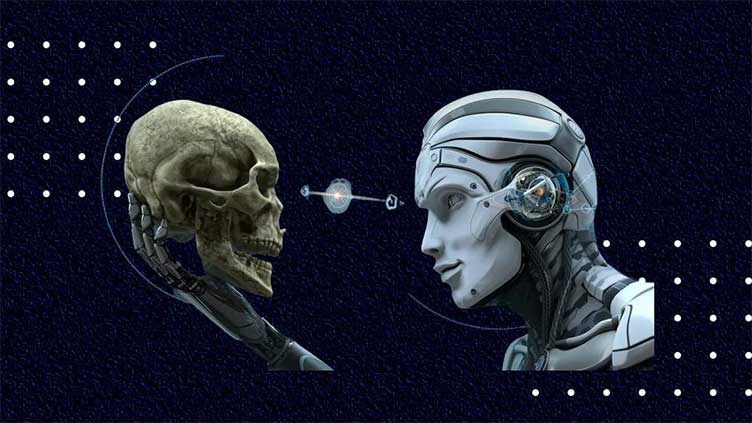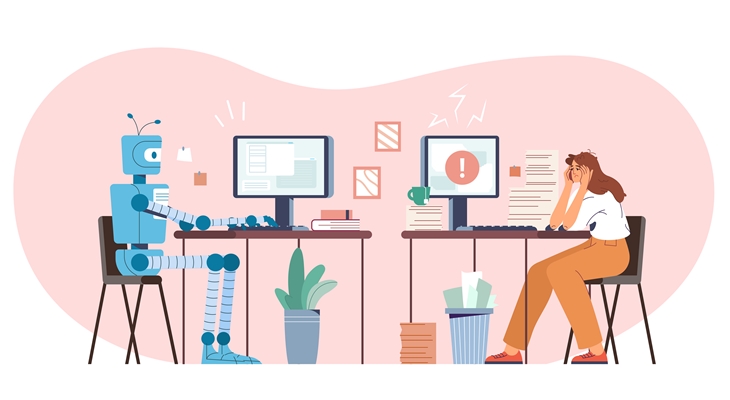Can AI really surpass humans?

Technology
Machines, apparently, look on track to outperform humans, but can they really?
By Ali Haider
Human beings are the rulers of this world. They are the masters of their destiny. No other creature, even physically stronger than them, has challenged their utmost control of the planet.
The reason is: They are more intelligent than any species. Their knowledge works as the most important factor of their control.
Faced with life-threatening diseases, they created medicines and to create ease in their lives, they have built infrastructure and invented technologies such as motorbike, car, train and aeroplane.
None of their inventions has posed any threat to the sheer and complete dominance of Homo Sapiens.
Now imagine another species, organic or inorganic, which is a thousand times more powerful than humans. It has performed tasks at a rapid pace and is on track to replace people with algorithms and robots.
In recent years, artificial intelligence – human being’s brainchild – has created so much space in the workspace that now it is acting as a potential challenge to the supremacy of humans. Before arguing whether AI can beat humans, it is pertinent to discuss the growing role of machines in the workspace once thought of as belonging only to humans.
Ever-increasing expansion of AI
AI knows no limits. It was created for the benefit of humans but now it has overstepped its boundaries. Various examples prove this point.
A - Consider a recent report in the Atlantic which stated that 183,000 books were used in generative AI systems without the consent of authors. Companies like Meta, Bloomberg and OpenAI are using these books to teach their algorithms to write in the style of, say, Elif Shafak or J.K. Rowling.
This, as a result, signalled an alarm bell in the literary world and many authors went to the Atlantic website to check if their books were also published, of course without their consent.
In the future, one may read a book by a well-known author and one may not be able to know whether it is generated by AI.
B - This is not the only example. Another use of AI that is blurring the difference between fact and fiction is the deep fake technology.
This technique involves altering the appearance of a person so that he appears to be somebody else. Misinformation has become rampant and political opponents use this technology to target their opponents.
For instance, in March 2023, a deep fake image of former US president Donald Trump was released online in which he was seen as being arrested. Trump was facing an indictment case at the time of the release of pic – many took it for real.

What makes the release of ‘AI-generated fake photos’ even more problematic is that a lot of people fall into the trap. As the survey of PNAS – a scientific journal – has pointed out many people believe that AI-generated faces are more trustworthy than real faces.
C - Another dimension of AI that has created problems for a whole lot of people is the abuse of technology by authoritarian as well as democratic governments. This has led to human rights abuse.
How AI is helping the governments to keep a check on their populace? The Facial Recognition system by AI leads to the targeting of activists and political opponents who dare only to dissent.
Consider, for instance, the case of China which has utilised AI to monitor protesters and quell any protest. This system is also labeled ‘AI-tocracy’.
Also, Israel has been using AI to strengthen its occupation of Palestinian territories. The movement of activists is traced and even the privacy of encrypted texts is breached.
Consider a recent Amnesty International report that said, “Israeli forces are increasingly using facial recognition technology and AI algorithms to clamp down on the rights and privacy of Palestinians living under occupation.” This has been dubbed digital or automated apartheid.

D - Now imagine the impact of AI on the jobs that the homo sapiens are doing. Many tasks that people perform will be performed by AI-led algorithms.
The industry that will be most at risk include: ‘Customer service representative’ because now chatbots handling customers' inquiries and requests; graphic design as AI-generated art is the future and tools such as ‘Lensa’ have made it easier; drivers as AI seek to achieve the goal of driverless cars and trucks; and medicine as AI powered by ‘artificial neural network’ is now able to spot breast cancer just like a human radiologist, according to IBM research.
CAN AI BEAT THE HUMAN?
At present, AI looks unstoppable. It is on course to outperform humans in all spheres. Even in many fields, it has outshone the homo sapiens. But can it really beat those who pioneered it? The short answer: No it cannot go ahead of humans.

Despite the seemingly unprecedented technological prowess of AI, human beings will always be superior in a variety of ways.
A - For instance, it is the humans who have built modern algorithms in the first place. These AI-powered systems are fast but not creative enough like human beings’ cognitive ability to think. They are only as good as the data which is fed into them.
Undeniably, IBM’s AI-powered ‘Deep Blue’ defeated the chess world champion in 1997. But who was the designer of that programme? ‘Murray Campbell’ and ‘Feng-Hsiung Hsu’ developed that system and the last time the author checked they both are humans.
‘Deep Blue’ was able to outshine its opponents by calculating the probability and reading the opponents’ moves. However, it lacks creativity.
The human beings’ ability to think, plan and innovate a new tool differentiates them from AI. Computers can do a lot of things well, but creativity is not one of them.
B - Multitasking is also another trait of humans that will keep them superior to machines. A specifically designed AI system performs one particular task.
DeepStack, for instance, is a computer program of poker. It overshadowed its human opponent in 2016. However, this AI system will not play other games or perform other tasks because it has not been designed.
Human beings, on the other hand, perform various roles. They can study as well as work and can also change their profession depending on their interest.
C – The reason behind claims that AI will surpass humans is its perfect nature of work. However, this is not always the case.
For instance, according to the study of STAT – biotechnology pioneer - IBM’s Watson Supercomputer recommended ‘unsafe and incorrect cancer treatments’ in 2018.
Machines also possess the not-so-desired quality of imperfection. They are not error-free and whenever there is a blunder on their part, humans will come and sort out the problems.
D – Also, empathy and kindness are virtues that belong only to humans. In case of problems, people cannot go to ‘Siri’ and expect any sentimental response. They talk with each other.
Emotional intelligence is a separate discipline that deals with a person understanding not only his own emotions but also those of other people.
Machines, no matter how developed and latest, will not be able to manage sentiments and emotions. Hence, in this case also, the AI will not surpass humans.


